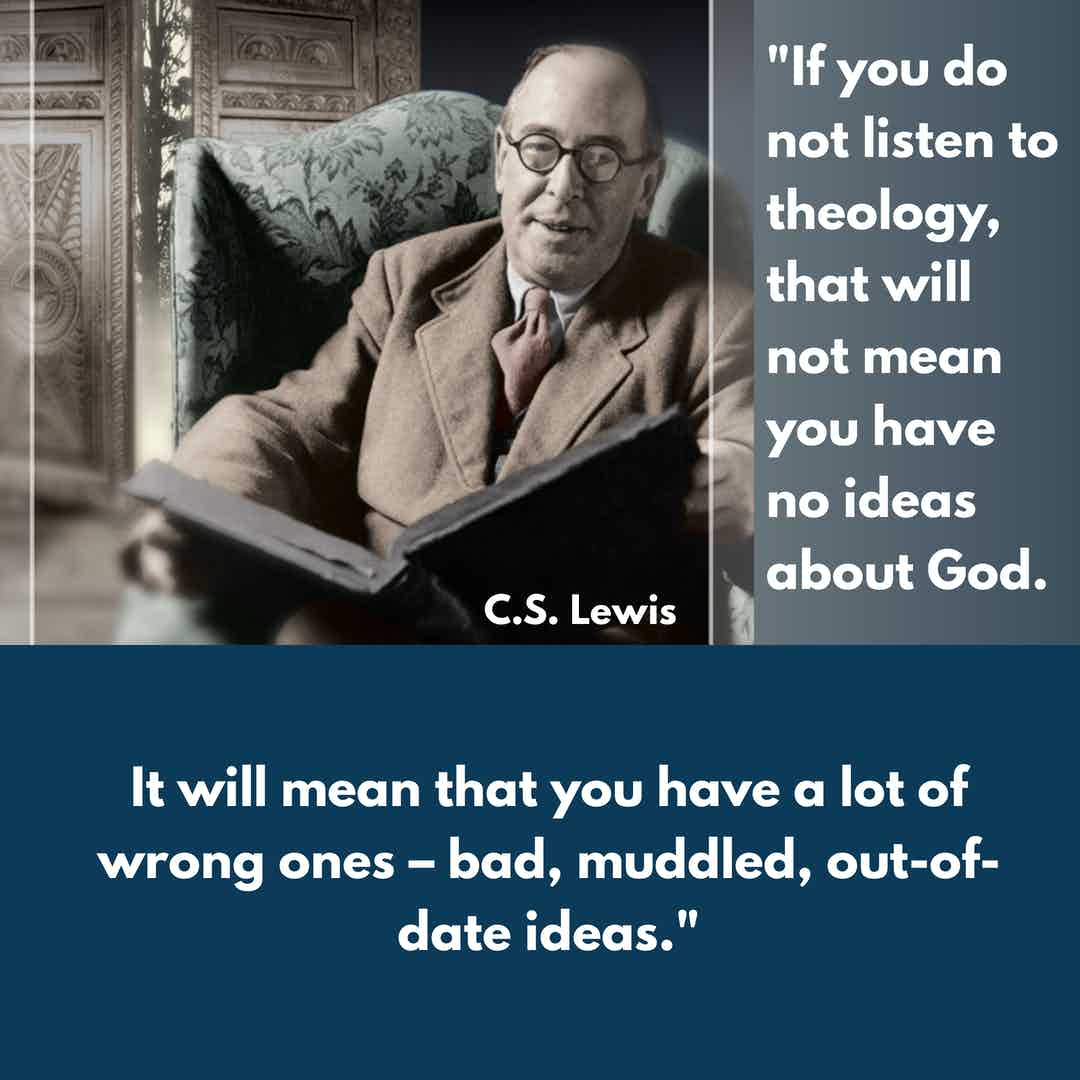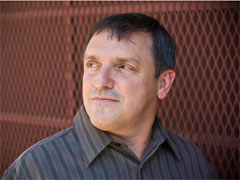Surprising Ways Theology Makes Us Better People
The word theology can sound like a boring mindgame for nerdy Bible professors. With all the problems we face today, who has time for theology? Shouldn't Christians focus more on activity than theology? More on healing the world's wounds than on correcting the world's beliefs?
In this article, I'd like to make the case for why theology matters. Even more, I want to show you the surprising ways that theology helps you become a better person.
Theology is the study of God and his plan.
In its simplest definition, theology is the study of God from the Bible. When we study theology, we discover who God is and what he is like.
As hugely important as this is, theology is even more than the study of God.
When we study theology, we not only study God, we also study the world he has made along with our place in it.
You can think of it this way — theology offers us the most comprehensive map of reality we can ever find. It is only when we can locate ourselves on that map that we discover our true identity and purpose.
If you really want to understand yourself, then there is no substitute for learning theology in your life.
Jesus himself used theology to help people really understand their place in the universe.
Jesus Was A Theologian...And His Stories Prove It
When Jesus crafted his parable of the Rich Man and Lazarus (Luke 16:19-31), he used specific theological terms. He talked about Abraham's Bosom, Hades, and a Great Gulf. He also mentioned Moses and the prophets. All of these were theological terms. They were also familiar to his audience.
Jesus assumed that they would understand what he meant. He made this assumption for one simple reason — the Jewish culture of his day was diligent about teaching theology from childhood on up.
Sadly, they made their theology a mental mind game and little more.
But that didn't stop Jesus from using theological terms that even the common people would understand.
Jesus even used a theological term in his last moments on the cross. He told the penitent thief, "Today you will be with me in Paradise," using a technical term that the Jews understood as synonym for Abraham's Bosom.
He talked about heaven, hell, angels, demons, the Law, the Prophets, creation, redemption, forgiveness, truth, the heart, the mind, the body, human nature, regeneration, justification, judgment, rewards, faith, grace, and eternity.
All of these are theological categories, and if they mattered to Jesus, we can safely conclude they should matter to us.
Perhaps this is because of the purpose of theology and its goal.
Theology organizes everything the Bible teaches on a topic
The purpose of theology is to organize our thoughts about God. Actually, theology helps us organize our thoughts about everything the Bible says, topic by topic.
The Bible is the biggest book (library of books) most people will ever own. It is not organized by topic. Instead the Bible tells the real life story of God's people as they interact with God and his world.
Thousands of years of history are captured in the pages of God's Word.
Under the inspiration of the Holy Spirit, this history was written down in carefully crafted words. These words — the words of Scripture — were intended not only to preserve history, but more importantly, to communicate theology.
For example, the story of God parting the Red Sea is there not only to preserve that epic moment of history, but also to graphically reveal the doctrine of redemption.
The story of Ruth tells what actually happened with Naomi and Boaz, and their tragic losses. But it is also crafted to show in real life what grace looks like — a costly, self-giving love for those who have no legal claim to it.
Most Christians learn the Bible in bits and pieces. A sermon here, a video, a podcast, a book, a small group or Sunday school class. These pieces seem unrelated. At times they can even seem contradictory, like pieces of a puzzle that just don't fit each other.
The beauty of theology is that it provides the box top. Theology shows us how all the pieces of biblical teaching fit together into a breathtakingly beautiful revelation of the heart of God and his love for this world.
When you study theology, you increasingly see the world the way God sees the world. The way Jesus sees the world. Your life and world begin to make sense.
And that is when theology fulfills its highest purpose. And that is when the transcendent goal Jesus has for your life actually comes into being.
Jesus' Greatest Command: Love God, Love Others
So he answered and said," 'You shall love the LORD your God with all your heart, with all your soul, with all your strength, and with all your mind,' and 'your neighbor as yourself.'" (Luke 10:27, NKJV).
Love is the goal. Love as a choice. Love as a character quality. Love for God. Love for our spouse and our family. Love for the pool of God. Love for the world for whom Christ died.
But the constant teaching of Scripture is that such a love is impossible unless it flows from a mature heart — a heart that is rooted and grounded in God through his Word.
Peter rooted this life of love in the truth of God when he wrote, "Since you have purified your souls in obeying the truth through the Spirit in sincere love of the brethren, love one another fervently with a pure heart" (1 Peter 1:22).
In Paul's famous Love Chapter in 1 Corinthians 13, he calls us to a higher kind of love that can only come from a place of maturity in the Lord, which always depends on growth in truth and grace.
When I was a child, I spoke as a child, I understood as a child, I thought as a child; but when I became a man, I put away childish things. (1 Corinthians 13:11, NKJV).
Theology matters because love matters.
You can't love a God you don't know. And you can't love anyone at all unless your heart has been purified and matured through the healing power of God's Word.
Here's how that happens.
How does theology heal us?
God gave us theology not just for information but also for healing.
Grace comes to life at the intersection where theology meets psychology.
Think about it this way. Theology tells us that God has joined every true Christian to Christ. We share his nature. We share his identity. His possessions, his dignity, and his riches.
This is the deepest truth about us.
God calls you Rich. Blessed. Provided for. Taken care of.
God calls you ready for anything. Provisioned. Fully outfitted for whatever pathway your journey takes you on.
You are the possessor of the unsearchable riches of Christ. This is the real you. The true you. The authentic you.
But if that's the case, why is it that so few Christians actually feel that reality in their experience?
The answer is because our whole inner world — our psychology — has been damaged by the Fall. Sin messed with us. It distorted our identity, corrupted our nature, and broke our hearts.
This brokenness is both our nature and our experience. "We were by nature," Paul says, "children of wrath" (Ephesians 2:3). This plays out in every experience and relationship through dysfunction, despair, addiction, and self-absorption. It's a mess.
But salvation comes to give us a new nature.
And spiritual growth comes along to give us a new experience based on a new maturity of heart and life.
Through spiritual growth, theology takes a scattered mind and makes it an organized mind. Theology takes a broken heart and makes it whole. Theology defragments your soul, and integrates all the parts of you into a coherent, beautiful whole.
Theology makes you a better person by enabling you to live up to who you really are in Christ.
God uses his truth to reverse a lifetime of lies we've come to believe. He peels off decades of self-defeating labels. He delivers from the bondage of other people legalism and rules. He restores the brokenness of our past, and reframes the scripts that run through our minds.
Truth heals the soul.
Theology matters. Doctrine matters more than we realize.
But how do you understand theology?
Though the power of God's Spirit, and by the presence of Christ in us, God uses the deepest truths of Scripture to heal the deepest brokenness of our hearts... and the result is a deeper, stronger, more enduring love than we ever thought possible. This is God's work, God's power, and God's grace.
And healthy theology is the catalyst for it all.
Rightly taught and embraced, theology doesn't just make us smarter, it makes us whole.
Where can I learn theology?
There are six places you could try.
1. Veritas School is a great place to go if you're looking for more of an in-depth, academic course on the study and practice of Christianity. We offer a three year (or faster) Master of Ministry Certification at a fraction of the price of regular seminary. Right now, you can test the waters with a 30-day full-access enrollment. Cancel any time. You have nothing to lose and everything to gain.
2. A second option is a standard seminary. They are all over the country and most of them offer online courses. They also offer accredited degrees. One downside to seminary is the cost. Plan on spending tens of thousands of dollars. Another downside is the hit or miss nature of different professors. Do your research and choose wisely. If you really feel called to a lifetime of ministry, get the best education you can. It will serve you well for the rest of your life.
3. If your focus is less formal education about theology and doctrine, then books would be best; there's no shortage of them! In fact it's the overwhelming supply that makes this difficult. I recommend you start with older books and theology, and see how it works for you. If you enroll in Veritas, you will have access to a 30 page bibliography of the suggested commentaries for every book in the Bible.
4. As a fourth option, you might want to check out a wide variety of websites and other online resources. The main difficulty will face is that there are very few websites that offer a comprehensive approach to learning and implementing theology in your ministry. You'll have to pick and choose from a wide number of sources.
5. In an ideal world, the primary source of theology in our lives would be your church. In-depth, theological preaching. Bible studies. Systematic approach is to discipleship and spiritual growth. All of these things should be coming from the church, but the truth is they are in short supply.
6. Finally, and most importantly, read your Bible. Some of the best theologians on earth are our spiritual grandmothers and grandfathers who have worn out many Bibles. As they have read, as they have grown in the Lord, the Holy Spirit has created theological structures in their hearts and minds.
One of the best theologians I ever knew was a Bible teacher named Lois, she had. She had no formal theological training, but had read and reread her Bible till she knew it inside and out. At one point she debated a seminary president and held her own.
In the end, theology matters because Jesus matters. All theology points to him. He is our Savior, our Sanctifier, our Healer, and our Coming King. To know him deeply is to enjoy real life now and forever.



